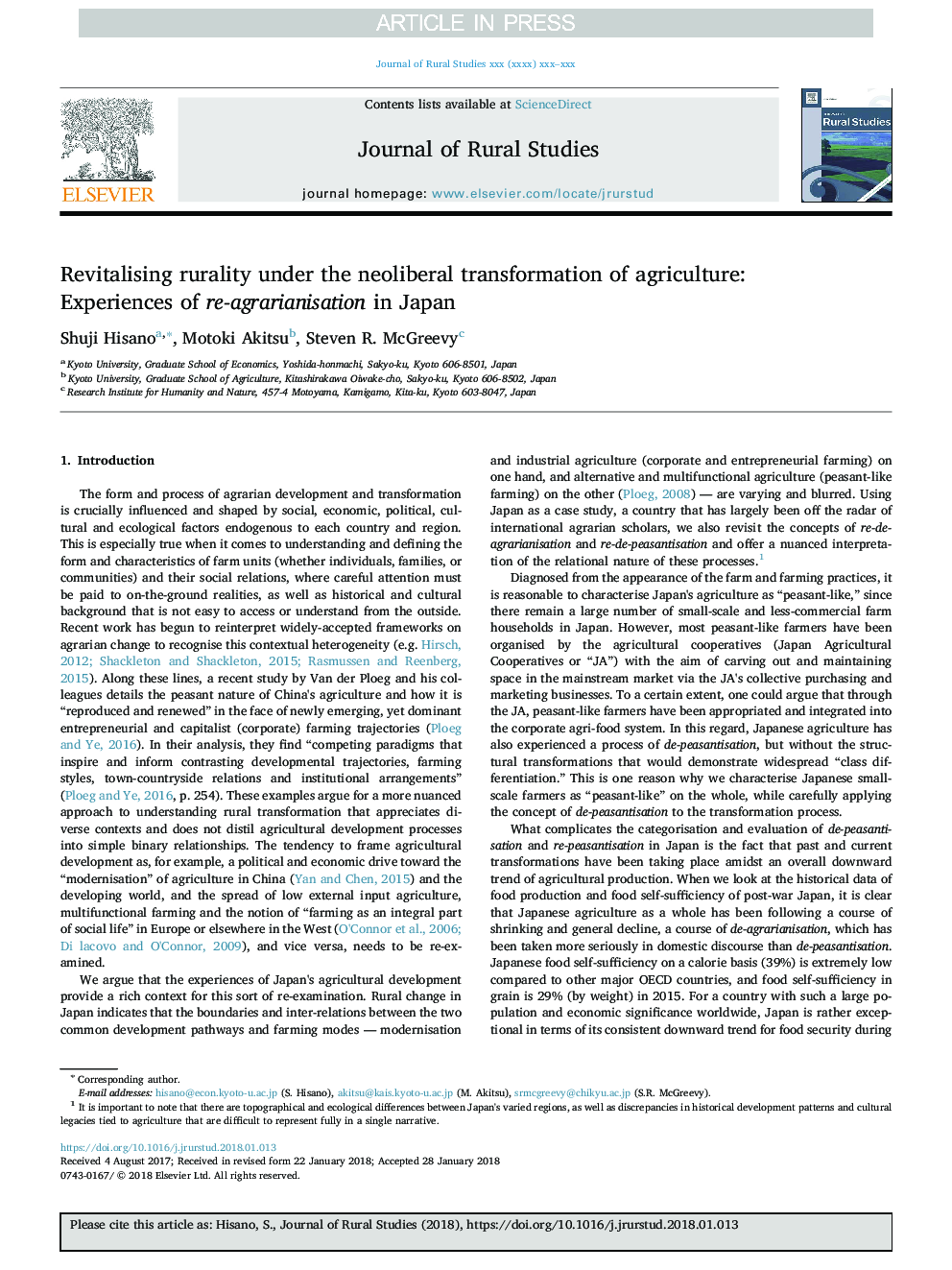| کد مقاله | کد نشریه | سال انتشار | مقاله انگلیسی | نسخه تمام متن |
|---|---|---|---|---|
| 6545258 | 1421770 | 2018 | 12 صفحه PDF | دانلود رایگان |
عنوان انگلیسی مقاله ISI
Revitalising rurality under the neoliberal transformation of agriculture: Experiences of re-agrarianisation in Japan
ترجمه فارسی عنوان
تجدید حیات روستایی تحت تحول نئولیبرال کشاورزی: تجربه تجدید زراعت در ژاپن
دانلود مقاله + سفارش ترجمه
دانلود مقاله ISI انگلیسی
رایگان برای ایرانیان
کلمات کلیدی
دوباره کشاورزی، دوباره پسته سازی مطالعات کشاورزی ژاپن، کشاورزی پیشرفته شرکت های کشاورزی مشترک،
ترجمه چکیده
مکان های روستایی به طور مداوم تغییرات اجتماعی و اقتصادی را تجربه می کنند و چارچوب های مفهومی بازآفرینی و توسعه مجدد دهی به منظور توضیح تحولات کشاورزی به معنای گسترده طراحی شده است. در ادامه مطالعات تجربی از دیگر زمینه های جغرافیایی، در این مقاله، مفاهیم بازآفرینی و بازسازی مجدد از طریق لنزهای تاریخی، نظری و تجربی تغییر زراعتی و روستایی در ژاپن بازبینی می شود. پس از مشخص شدن شرایط بازسازی کشاورزی بعد از جنگ جهانی دوم و شرایط فعلی روستایی، و همچنین مشخص ساختن زمینه مطالعات ارزیابی ژاپنی و انتخاب نظریه های درونزای درونی برای توضیح تحولات، نمونه های معاصر و یک مورد مورد استفاده برای ارائه یک گزارش غنی از تجربیات تجدید حیات ژاپن و دوباره گیاهخواری. ما دریافتیم که شرایط اقتصادی، اجتماعی، فرهنگی، ژئوپلیتیکی و بیوفیزیکی در ژاپن روند فرایندهای تغییرات زراعتی را شکل داده و منحصر به فرد بودن واکنشهای درونی آن را به دگرگرائی و روند نئولیبرال کشاورزی منحصر کرده است. به طور خاص، فشار اجتماعی-فرهنگی برای همکاری و شناسایی با جامعه محلی و محل اجازه می دهد تا یک "دهقانی مانند" علیرغم فشار قوی در زمینه کارآفرینی و کارآفرینی، عناصر به وجود می آیند. پس از درک این مسیرهای تحول کشاورزی ژاپن، کاربرد و پذیرش تعاریف عمومی پذیرفته شده در زمینۀ کشاورزی دوباره و کشاورزی را به چالش کشید.
موضوعات مرتبط
علوم زیستی و بیوفناوری
علوم کشاورزی و بیولوژیک
جنگلداری
چکیده انگلیسی
Rural places are continually experiencing socio-economic change and the conceptual frameworks of re-de-agrarianisation and re-de-peasantisation were devised to explain agrarian transformations in a broad sense. Following empirical studies from other geographical contexts, this paper revisits the concepts of re-de-agrarianisation and re-de-peasantisation through the historical, theoretical, and empirical lens of agrarian and rural change in Japan. After detailing the circumstances of post-WWII agricultural reconstruction and current rural conditions, as well as outlining the development of the field of Japanese agrarian studies and a selection of the endogenous theories within to explain transformations, contemporary examples and a case study are used to provide a rich contextual account of Japan's experiences of re-agrarianisation and re-peasantisation. We find that economic, social, cultural, geopolitical, and biophysical conditions in Japan have shaped the processes of agrarian change and bring into focus particular uniqueness of endogenous responses to de-agrarianisation and neoliberal agricultural trends. In particular, socio-cultural pressure to cooperate and identify with local community and place allows “peasant-like” elements to persist despite the strong push toward entrepreneurial and corporate farming. Understanding these trajectories of the transformation of Japanese agriculture would then challenge and/or validate the applicability of commonly accepted definitions of de-re-agrarianisation and de-re-peasantisation.
ناشر
Database: Elsevier - ScienceDirect (ساینس دایرکت)
Journal: Journal of Rural Studies - Volume 61, July 2018, Pages 290-301
Journal: Journal of Rural Studies - Volume 61, July 2018, Pages 290-301
نویسندگان
Shuji Hisano, Motoki Akitsu, Steven R. McGreevy,
